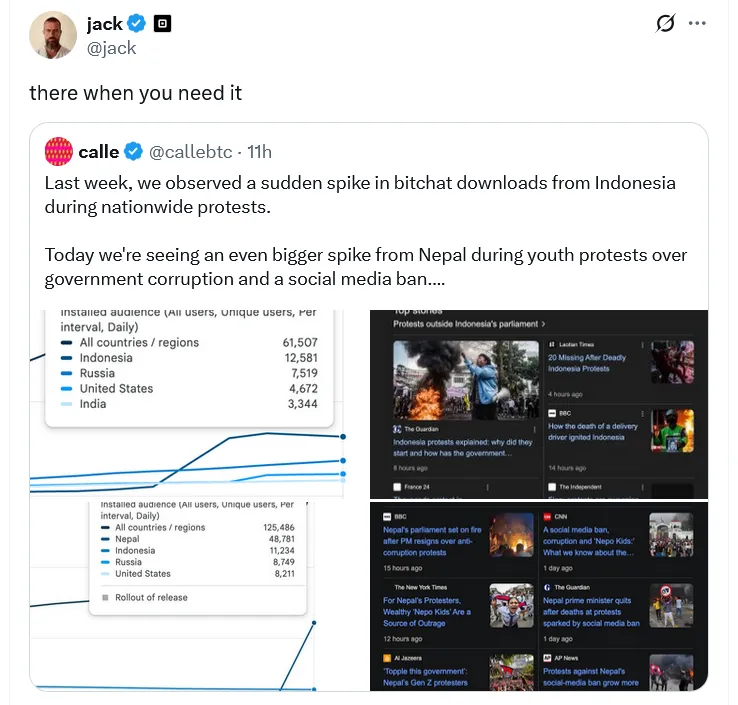Jack Dorsey’s Decentralized App Bitchat Surges to 48K Downloads in Nepal Amid Protests and Social Media Ban
-

Jack Dorsey’s new peer-to-peer messaging app bitchat saw a massive adoption spike in Nepal this week, with over 48,000 downloads as violent anti-corruption protests coincided with a temporary ban on Facebook, Instagram, WhatsApp and YouTube.
 Social Media Ban Triggers a Mass Shift
Social Media Ban Triggers a Mass ShiftAccording to open-source developer callebtc, Nepal downloads jumped from just 3,344 last Wednesday to 48,781 on Monday, far outpacing Indonesia’s 11,324.
The government briefly blocked major social platforms to suppress anti-government content as Gen Z-led protests escalated, with parliament and the supreme court set on fire.
Security forces responded with live fire and tear gas, leaving at least 19 dead and hundreds injured. Prime Minister KP Sharma Oli, accused of corruption and misuse of funds, has since resigned.
 Why Users Are Turning to “Freedom Tech”
Why Users Are Turning to “Freedom Tech”The Nepal and Indonesia surges highlight a global shift toward decentralized, encrypted communication tools to avoid government surveillance and censorship.
bitchat operates on Bluetooth mesh networks, allowing encrypted, internet-free messaging.
No accounts, emails, or phone numbers are required—no central servers, no single point of control.
Similar privacy-focused apps include Signal, Session, Status, and Nostr-powered Damus.
 Bigger Picture: Censorship vs. Privacy
Bigger Picture: Censorship vs. PrivacyWhile Dorsey’s app is only two months old, its growth underscores rising demand for secure alternatives as global regulations tighten:
The European Union’s proposed “Chat Control” law would force messaging platforms to scan messages before encryption, potentially undermining privacy across Telegram, WhatsApp and Signal.
In contrast, bitchat’s fully decentralized architecture makes pre-encryption scanning nearly impossible.
 Still Tiny vs. Big Tech — For Now
Still Tiny vs. Big Tech — For NowDespite the buzz, decentralized apps remain far behind Meta’s scale, with Facebook, Instagram, and Messenger collectively averaging 3.48 billion daily users as of June 2025—a 6% year-on-year increase.
Yet the explosive, real-time adoption during political unrest in Nepal and Indonesia shows how quickly secure peer-to-peer networks can surge when mainstream platforms are blocked.

















